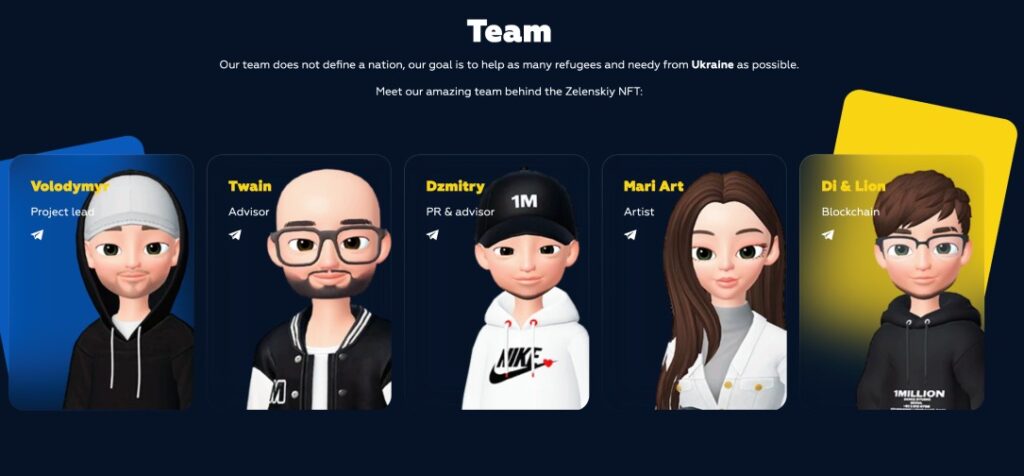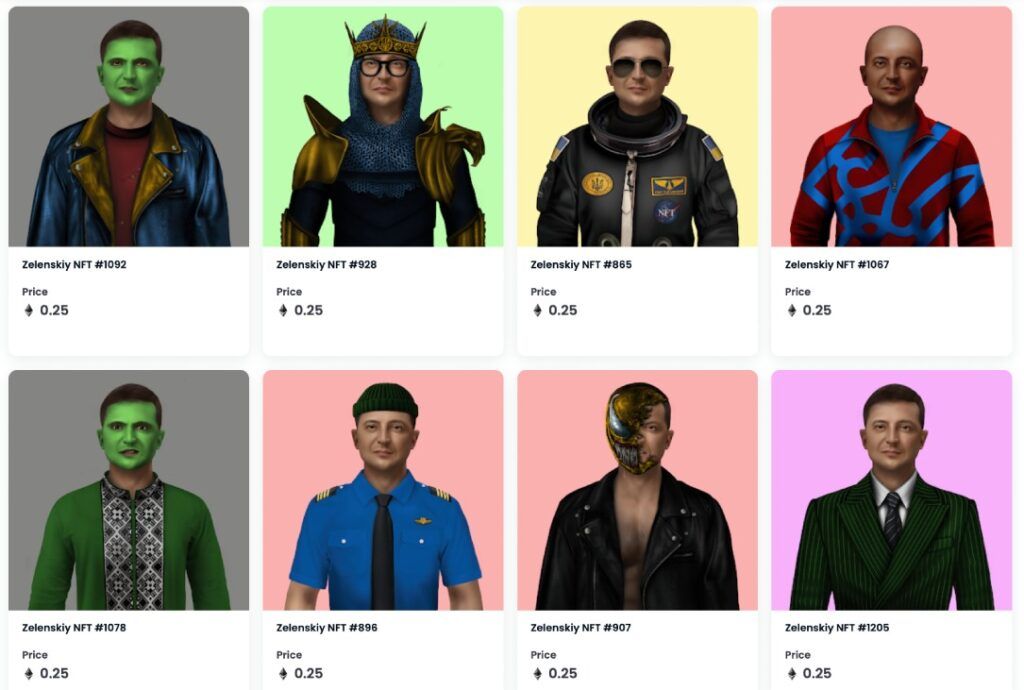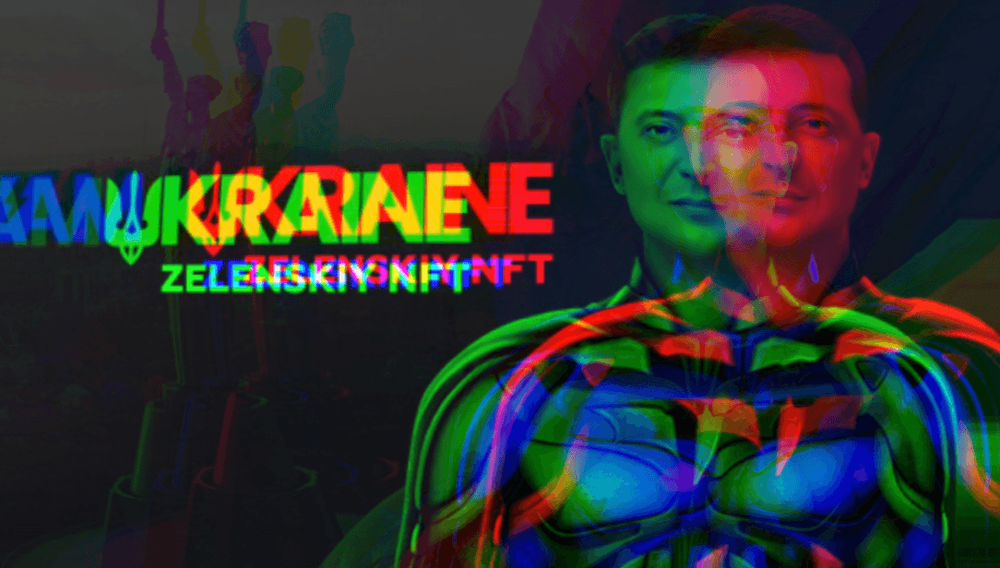NFT scammers see an opportunity in Ukraine donations
The Ukrainian government and celebrities have been promoting non-fungible tokens (NFTs) and cryptocurrencies to raise funds for the country's military during its ongoing war with Russia.
Although the tactic has proven to be effective — in the first five weeks of the war, Ukraine received more than $135 million in cryptocurrency donations — there’s a downside. Like much of the cryptocurrency industry, donation campaigns for Ukraine are rife with fraud and scams, according to researchers.
On Tuesday, Ukrainian open-source intelligence company Molfar published an investigation detailing how a firm called ZelenskiyNFT sold Ukrainian-themed NFTs allegedly to help the military and refugees, but instead seemed to have pocketed the money.
The co-founders of ZelenskiyNFT dismissed the accusations, calling the investigation “absurd.” The Record reached out to the organization through the Telegram messaging app — an advisor using the pseudonym “Twain” for security reasons said that “all proceeds from the NFT sale were transferred to charities.”
“We are very transparent,” he added, but provided no additional details.
Some of the charities look suspicious, according to Molfar: they were created between March and May of this year, they have a handful of followers on Facebook, and there is no information about their founders or total donations collected. Their social media accounts seem to be followed by bots, Molfar found.
Other Ukrainian charities listed by ZelenskiyNFT told The Record they received no money from the group. Just one organization confirmed that it received 1.18 ETH (about $1,300) from ZelenskiyNFT.
A mysterious company
Behind the ZelenskiyNFT project is the little-known studio IamUkraine. Molfar investigators said they couldn’t find the firm in any existing company registers. Publicly, however, the project claims it’s working with leading startups and Fortune 500 companies.
All that is known about the company’s employees and owners are names and digital avatars made with the free app ZEPETO.

ZelenskiyNFT collection – traded on NFT marketplace OpenSea – consists of more than 9,500 artworks, each representing Ukrainian President Volodymyr Zelensky in various personas – Hulk, Doctor Strange, Ninja Turtle, Iron Man. One NFT costs about $276.
Molfar’s OSINT investigation found that Twain is a Russian citizen, and his co-founders — Dzmitry and Volodymyr — are Belarusian and Ukrainian, respectively. Most of the team now lives in the Czech Republic but were born in Russia, according to Molfar.
“The team does have people from Russia,” Twain confirmed to The Record. “And the fact that there are those who care among Russians only deserves respect.”

Twain did not say how much money the charities received from ZelenskiyNFT. The employees of Ukrainian Balu Charity and Tabletochki told The Record that they discussed a possible partnership with ZelenskiyNFT, but haven’t received any funds.
A spokeswoman for Donor.ua told The Record that the organization received about $1,300 in Ethereum from ZelenskiyNFT, but the transaction wasn't straightforward.
A representative for a charity called People's Coalition told The Record that his fund has received “hundreds of thousands of dollars” from ZelenskiyNFT since March 2022, even though NFTs from the group only started trading in June.
The spokesman also asked The Record to write “only good things” about the project because “it gives a lot of money” to his organization. He refused to specify the number or what causes the charity supports.
There are other signs that point to an alleged scam, according to Molfar. The company's Twitter account, for instance, has 17,000 followers, most of which seem to be bots. Its Instagram has only 13 followers.
The company also paid for its advertising in Ukrainian and foreign media – there are no organic mentions of it on the internet, Molfar found.
Additionally, ZelenskiyNFT doesn’t work with local authorities, such as the state-funded NFT Museum, which sells digital art to raise money for Ukraine. Its spokeswoman, Valeria Panina, told The Record that she “heard that this project is a scam.”
What’s next for NFTs
Fraud is rife in the NFT market. In February, OpenSea users lost $1.7 million in NFTs in a phishing attack; nearly $2.9 million was stolen when the Bored Ape Yacht Club's Instagram account was compromised.
And as NFTs have become more common in philanthropy, scammers have jumped in as well. Creators of the NFT project Doodled Dragons, for example, promised to donate all earnings to charity, but took all the money and ran.
There are several charitable NFT projects in Ukraine in addition to the NFT Museum, such as Avatars for Ukraine. These projects are backed by the government and are transparent about the total amount of funds raised and how they will use them.
100 days of war are like an endless nightmare. Despite this, we’ve realized that we live in the most glorious country with the the most courageous people in the world. Hard times made us a real family. And now we share one simple wish to live in peace at our home named Ukrainepic.twitter.com/aldC209xpK
— Meta History: Museum of War (@Meta_History_UA) June 3, 2022
“It’s easy to fall victim to crypto scams in Ukraine these days,” Artem Starosiek, CEO at Molfar, told The Record. “People are so eager to help their country that they rarely engage in critical thinking.”
On July 6, Starosiek told The Record that Molfar had reported ZelenskiyNFT as fraudulent content on OpenSea and filed a complaint with the cyber police of the Czech Republic as well as Ukrainian law enforcement.
Daryna Antoniuk
is a reporter for Recorded Future News based in Ukraine. She writes about cybersecurity startups, cyberattacks in Eastern Europe and the state of the cyberwar between Ukraine and Russia. She previously was a tech reporter for Forbes Ukraine. Her work has also been published at Sifted, The Kyiv Independent and The Kyiv Post.



